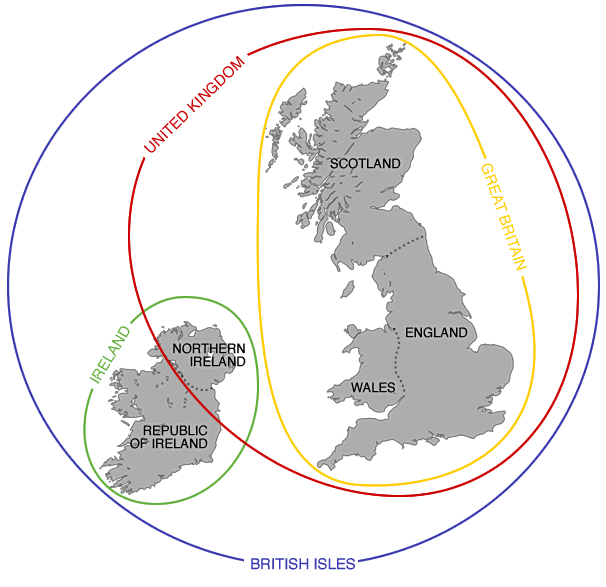
The map above demonstrates the difference between the British Isles, United Kingdom, Great Britain, and England. While the terms are often used interchangeably they actually mean different things.
The British Isles – While this is most common name for the archipelago, it is not used in the Republic of Ireland who instead refer to them as either the British-Irish Isles or simply as “these islands”.
Whatever name you choose, it consists of the islands of Great Britain, Ireland and over six thousand smaller isles (including: the Bailiwicks of Jersey and Guernsey and the Isle of Man). In total they cover an area of 315,159 km2 (121,684 sq mi) and collectively have a population of just over 67 million people.
- Great Britain:
- England The largest country in Great Britain accounting for 57% of the area (130,279 km2; 50,301 sq mi) and 86% of the population (53 million).
- Scotland The 2nd largest country in Great Britain accounting for 34% of the area (77,933 km2; 30,090 sq mi) and 9% of the population (5.3 million)
- Wales The smallest country in Great Britain accounting for 9% of the area (20,779 km2; 8,022 sq mi) and 5% of the population (3 million)
- Ireland:
- Republic of Ireland: Accounts for 83% of the area of Ireland (70,273 km2; 27,133 sq mi) and 72% of the population (4.6 million).
- Northern Ireland: Accounts for only 17% of the area (14,130 km2; 5,456 sq mi) and 28% of the population (1.8 million) of the island of Ireland.
Is the larger of the the two main islands in the British Isles accounting for 73% of the land area (229,848 km² km2; 88,744 sq mi) and 90% of the population (60.8 million). It is divided into three countries all of whom are part of the United Kingdom (see below).
Is the smaller of the two large islands in the archipelago, accounting for 27% of the land area (84,421 km2; 32,595 sq mi) but just under 10% of the total population (6.4 million). It is divided between the fully independent sovereign state of the Republic of Ireland and Northern Ireland which is one of the four countries of the United Kingdom (see below)
United Kingdom: The United Kingdom is a fully independent sovereign state made up of the the 3 countries on Great Britain plus Northern Ireland, which is reflected in its full name: United Kingdom of Great Britain and Northern Ireland.
Now for the fun bit: Everyone from England, Scotland and Wales is also British, but not people from Northern Ireland who are Irish (despite also being UK citizens). People from the Republic of Ireland are just Irish. And, none of these groups, except for people from England, should be referred to as English.
If that doesn’t fully make sense, then watch the video below which explains it in even more detail:
If you’d like to learn even more, then the following books may be of interest:
- The Peoples Of The British Isles: A New History From 1870 to the Present
- The Road to Little Dribbling: Adventures of an American in Britain (also see: Notes from a Small Island
- The Story of Ireland: A History of the Irish People
Find this post interesting? Please help us by sharing it:
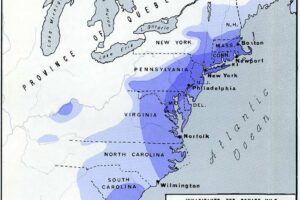

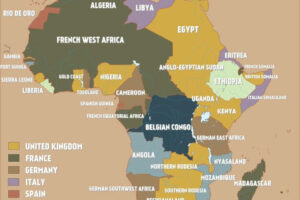
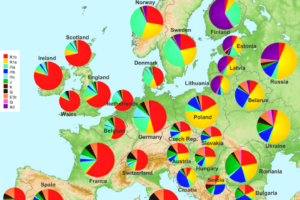
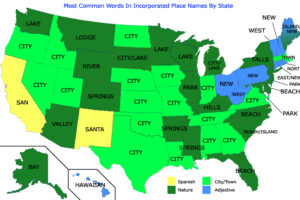
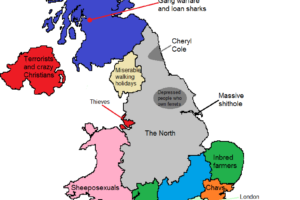
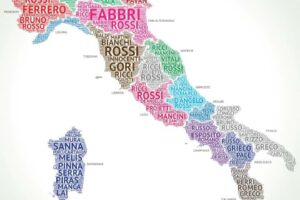
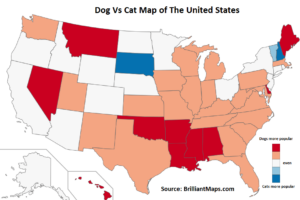
nogginthenog says
The Isle of Man is not part of the United Kingdom.
Ian says
Neither is Cornwall!
Lisa Dunville says
since when?
Carl says
Er.. yes it is…
Chris says
Er.. no it’s not and never has been.
Shif says
Yes. The Isle of Man is not part of the UK is it?
John Bragg says
The Ulstermen of Northern Ireland would like a word with you about not being British.
Dave Allen says
Unionist Ulstermen.
Lego Pig says
Check their bags and under their cars before they arrive at the meeting.
Peter Callomon says
they would probably say they were dutch.
Vincent Murphy says
You seem to have forgotten Cornwall
dagny says
Cornwall is in England
Myles says
But all english / uk law has to be ratified by the dutchy of cornwall…it isn’t automatically part of their law.
Lego Pig says
Also Wales is not a real country, it is a Principality, hence why we have a Prince of Wales.
Steven Oliver says
Although we refer to it as a principality in the UK it isn’t in reality, as the Queen is the official Head of State, not the Prince of Wales. Unlike other Principalities that are ruled by Princes (sorry)
Ken says
Wales still struggling from the feudal system.The silver spoon prussian pratt
Asterix says
Die spinnen, die Briten.
mP says
Principality means a Prince is the head of said state, it doesnt mean its not a country, a bit like Kingdom implies King. Monaco is a principality because it has a Prince as head of state and i dont think anyone would challenge the fact Monaco is a country.
Iwan Williams says
No, a principality is ruled by a prince. Prince Charles does not rule Cymru (Wales) – thank God.
Philip Owen says
The Principality is only part of Wales. The part taken by the Crown from the Welsh princes. The rest of Wales and indeed neighbouring parts of England was The March or really Marches. Each distinct part of the Marches had its own independent legal system and largely independent baronial ruler. The border was clarified, greatly to English advantage, and laws unified in the late 1530s by a series of Laws in Wales acts. Something like modern Wales and the Marches (Cheshire, Shropshire, Herefordshire, Gloucestershire and Worcestshire) was then legally managed by The Council of the Marches until the early 19thC. So although often referred to as such, Wales is not a Principality. It is early 20thC theatre to call it so.
Andrew Bowen says
Wales has not been a principality since the 16th century and is incorrectly termed a principality as it is not governed by a prince. The Prince of Wales has no authority over the government of the country and the title confers no authority over the population of Wales
George Michaelson says
IoM not being formally part of the UK, but being part of Britain it probably has to be a disjoint set Venn Diagram to avoid having overlaps which are not formally correct.
Peter Bierwirth says
Very informative tour d’horizon, even though it’s a bit difficult to follow the speed of the speaker’s explanations. But isn’t it a bit presumptuous to “include” the Republic of Ireland within the term “British (?) Isles”? Why not give back Northern Ireland to the Irish and only use the term Great Britain (England, Scotland, Wales)? Whereas one could also live without the “Great” and just call it “Britain”. You normally do not call yourself “great”, it’s a matter of taste and we continentals prefer the British understatement. As far as the “Bailiwicks” are concerned, thus far I have not heard of them. Have to get some information. For “normal usage” we continentals rather use the term “England” rather than Great Britain with the silent implication that England includes Scotland and Wales.
uglyfatbloke says
…whereas we non-continentals just say ‘Germany’ instead of ‘Europe’ with the silent implication (we don’t mind that it’s wrong) that France, Italy etc are just parts of Germany.
Byron Hunt says
Nice one!
As a naturalized British citizen from the United States, being neither English, Scottish nor Welsh, I have always claimed only to be British while cheekily claiming I take only the best from all three cultures and leave out any of the bad, if any.
Having said that, however, I also claim an immense affinity with the Irish and have faithfully worn my Claddagh ring since the early 1980s after a brief but fulfilling visit to Dublin.
Incidentally, a Northern Irish chap I met in Dublin INSISTED on being called British and NOT ‘just’ Irish. Go figure. Being a ‘foreigner,’ I just stay out of those nationalist squabbles.
p.s. I do know that POTUS 45’s claim of being part ‘Scotch’ is ridiculous also. It’s either Scots or Scottish. Scotch is whisky (note spelling), egg or tape, not a nationality.
Alex Campbell says
I take it that you are also referring to the English people of colour, who happen to be moslem who live in Birmingham and London, England. The people of Ulster in Northern Ireland have every right to be British, as much if not more so than an Asian born in England. Moreover, the Northern Ireland people’s DNA is traceable in the British Isles for thousands of years. The Ulster Protestant ethnicity is genetically more British than most people in London, including the current mayor, and the former mayor Boris Johnson. These UK citizens are born in the British Isles. Please, remember that before making snide, racist comments.
Karen kelly says
Can I claim an affinity for the indigenous Salish people after an amazing holiday many years ago to Vancouver island. And I like their art.
Richard Pickel says
All in good time.
Jim Law says
Calling Britain England is offensive to the Scots and Welsh as well being incorrect. It is often done by supposedly well educated English people, who in doing so, show ignorance and arrogance. I always use the term Britain and British unless I’m referring to something specifically English, Scottish or Welsh. Another factor is that there are a signifant number of Britons, like me, who are a mixture by virtue of birthplace and heritage and who prefer British. So, to be safe, say British and you’ll sound more more correct, less ignorant and arrogant, and better educated! Mainland continentals should do the same.
Nigel Lightbody says
The “Great” of “Great Britain” has the old meaning of “big”, and has nothing to do with the modern meaning of “great” as in “wonderful”. The “Great” here was to distinguish it from “Lesser Britain”, now better known as Brittany. Spelling in Middle English varied a lot, but in the example of “Grete Britaigne” you can already see the similarity to Bretagne/Brittany.
Bob Wyper says
Great Britain is simply the biggest island in the group of islands known as The British Isles…. just as Grand Cayman is the largest of the Cayman Islands.
More important is the unforgivable EXCLUSION of The Shetland Isles.
Andrew says
Of course they’re excluded – they’re Norwegian. We only have them because Christian I of Norway didn’t pay his debts.
Mike says
The “great” in Great Britain is not used in the subjective sense of being “good” or “above average”. It’s used in the descriptive sense of being larger in size, in this case compared to what is now called Brittany (“Lesser Britain” or “Little Britain” as it has been called). You can thank the ancient Romans for these names originally!
However, there is still a valid case for saying that the ‘Great’ is no longer needed, since Brittany now has a distinguishable name.
Edward says
Why is the United Kingdom Olympic team referred to as “Great Britain”? This seems to exclude Northern Ireland, which is part of the Great Britain team and doesn’t have its own team (unlike in the World Cup, in which it does).
And what would the official name of the nation be if Scotland were to secede? “The United Kingdom of England, Wales, and Northern Ireland”? I guess Scots would continue to be regarded as British, but it would be awkward (similar to how Mexicans are “Americans,” but this doesn’t seem to be a common usage).
A british person says
Team GB is the brand name used since 1999 by the British Olympic Association (BOA) for their Great Britain and Northern Ireland Olympic team.
https://en.wikipedia.org/wiki/Team_GB
E Wright says
It is insulting. See my reply above.
Lego Pig says
If Scotland left Great Britain would just be called England.
myles says
Actually the official team name is the United Kingdom of Great Britain and northern Ireland…
mP says
The Olympic team is referred to as GB, because that is an abbreviation of the full name of the country, the United Kingdom of Great Britain. There is no other United Kingdom or kingdom of any kind on within the islands of GB, so there is no confusion with Ireland the Republic.
Dann says
– Team GB is the Great Britain and Northern Ireland Olympic Team.
– There is only one Olympic team from Great Britain and Northern Ireland; Team GB.
https://www.teamgb.com/FAQ/6cDq12pRTl73iItVkAHbg4
Nicky Davidson says
So…does Shetland just not exist then?
tu says
The Shetland Isles are part of Scotland, they lie just north east of the northern tip of the Scottish mainland.
Maximiliano Herrera says
Shetland and Orkney were absorbed into the Kingdom of Scotland in the 15th century and remained part of the country following the formation of the Kingdom of Great Britain in 1707, and later the United Kingdom after 1801
E Wright says
Mmm. It’s close to how I would explain it, but the term ‘British’ indicates nationality, not ethnicity. Most people from Northern Ireland carry passports which say British Citizen on the inside cover. A great many also carry Irish passports on account of Republic of Ireland Statute Law which extends entitlement to its citizenship to persons born in Northern Ireland who have a British or Irish parent. You cannot be a British Citizen however and not be entitled to call yourself British.
The term may have originally been ethnic – when Boadecia was around, but the modern English are no longer British in that sense. They are a mix of Danes, Jutes, Germans, Normans, Indians and Jamaicans. Not many of the remaining ‘British’ can claim pedigree. Nor can many of the Irish for that matter, both islands have been subject to invasion / plantation / immigration during the last 1000 years. And of course ethnic nationalism only emerged in the late 18th Century anyway. Before that it was allegiance to kings which mattered.
The term British was popularised in the vernacular after the union of Scotland and England. They needed a term to describe the two together so came up with ‘Great Britain’ as the noun. When Ireland came onboard in 1801 they just tagged it on. So GB without the tag only refers to the original union. This is reinforced by the GB car number plate, which excludes Northern Ireland – it has its own ‘NI’ tag. So is Team GB an insult to Northern Ireland? Yes it is. The abbreviated inclusive tag should be UK. At least until the Scots leave.
As a side note, many non white English people prefer to call themselves British. This is a reaction to ethnic nationalist sentiment which is essentially a racist construct.
Mukund Biwalkar says
where is Arkansas England in United Kingdom?
Robert Basset says
I dare you to visit Northern Ireland, saunter into a bar at 11pm in East Belfast and insist they are not British.
You could do a map about where your body parts end up.
Arthur Jackson says
Personally, I would avoid any political talk of any kind in any pub in Northern Ireland.
Better safe than sorry.
Lego Pig says
I would rather avoid Ireland totally.
Martin says
Dear Lego Pig, Ireland is a beautiful country and well worth a visit. Like other places in the world, the problems of N.I. in the few decades past have unfortunately had a residual effect similar to the sentiments you’ve expressed. Being from the Republic of Ireland. I’ve never experienced any conflict or political problem; I love the British, have many British friends, British colleagues and British neighbours. I felt I needed to respond to this as I sometimes hear the same sentiments when abroad from other British people who have never visited one of their closest neighbours; take the ~1 hr flight over for the weekend; I promise, it’s well worth it!
M S says
I don’t go to gay bars.
JuHoansi says
Should Northern Ireland be considered part of Great Britain then?
Robert Basset says
It is located on the island of Ireland and is one of the four countries of the United Kingdom.
Myles says
They are as british as me and i am english 😀
bananasmoothie says
Go to a bar in the Falls and insist they are not Irish. 😉
rolandhp says
The Isle of Man isn’t in Britain or part of the UK, it’s a self-governing Crown dependency.
Lego Pig says
Apart from both people living there, nobody cares about the Isle of Man.
Stephen Mosley says
But is still part of the British Isles 😉
Cédric Legrand says
If Great Britain is the one largest ISLAND of the British Isles, it then does not include the other smaller islands around it, so the diagram on top of the page is wrong…
Stonekhold says
Wait a minute Canada is a province of the UK, so is it part of the isles group ?
Lori says
Canada is like Australia: we make our own laws, but the Queen is our head of state. We’re not a province of the UK. But we have her face on our coins.
Amy Lynn Garcia says
No, Canada is a part of the Commonwealth, not one of the Isles categorized as a crown dependency. The Commonwealth have their own local parliments and laws, self governing while still acknowledging the Crown/Queen Elizabeth II as their head of state. She’s just a figurehead.
Glenn Crawford says
What the eff… We are most definitely not a part of the United Kingdom
We became a self-governing dominion July 1, 1867 and through various acts and decisions, culminating in the Canada Act of 1982 we are a 100% sovereign nation
We remain in the Commonwealth, we retain connections with the UK but we are a country, you ignorant sot!
True North, Strong and Free (despite best efforts of current government)
Patrick O Malley says
JUST Irish?
Myles says
Yes by 6cm per year so in a few thousand years time they will be americas problem.
Lego Pig says
Something to look forward to then 🙂
karayuschij says
How can you call it United Kingdom when 50% of the population wants something and the other 50% of the population wants something else?
rolandhp says
not sure the Irish living in Monaghan or Louth would care to be included in the map’s red line.
Bannef says
The confusion for me comes from when to use the term “British.” The description in this article is helpful, but going off the conversation below about people in Northern Ireland, apparently it is not easily settled.
I just use the clunky “people from the UK” (or “people from Ireland” or “people from England,” etc.) as needed. Similarly, I say “people from the US” to avoid the “why do you people think you’re the only one who get to be called Americans?” debate.
Ian says
Is there a difference between “Britain” and “Great Britain”? Does “Britain” equal England and Wales but not Scotland and not Northern Ireland?
Carl Blakebrough says
Britain and Great Britain are just two names for the same thing.
Tom says
Haborra IOM, JERSEY, GUERNSEY?
Michael De Martini says
This is a great graphic. Thank you so much!!
Sanket Panja says
Very good explanation… Liked it…
Kilsally says
This is inaccurate. I am from Northern Ireland. I am British.
GT says
The nation’s name is The United Kingdom of Great Britain and Northern Island. NI isn’t part of Great Britain, even if you consider yourself ethnically British. It is part of island of Ireland and part of the UK.
Donald says
The unitary states name is The United Kingdom of Great Britain and Northern Island. The individual nations are named Scotland, England, Wales, Northern Ireland and Cornwall.
Martin says
Correct, the Good Friday Agreement which was agreed between eight political parties of Northern Ireland and the British and Irish governments recognises that the people of Northern Ireland can “identify themselves and be accepted as Irish or British, or both”; which seems fair.
Therefore, the following statement made by the author in the main article “Now for the fun bit: Everyone from England, Scotland and Wales is also British, but not people from Northern Ireland who are Irish (despite also being UK citizens)” should be amended. Nonetheless, it’s a complicated situation and this article clarifies some points very well.
d steele says
fascinating.
Walt Thomas says
Just got my DNA results. It says I am 70% Great Britain and 8% Ireland/Scots/Wales. Why didn’t they just say I am 78% Great Britain?
Kazoo86 says
This is so confusing, I think I’ll vacation in Germany instead. 😜
John Waters says
Presumably the Shetland Islands, which are not on the map, are no longer part of the UK. Does that mean we can stop paying British taxes?
Colin Cohen says
Channel Islands [les îles anglo-normande] anyone?
David Doyle says
For all of the know it alls, this seems to be an attempt at a simple explanation without too much detail. Directed to the rest of the world thinking what is GB, UK, British Isles etc.
Tom Cocks says
You did a great job denoting the sometimes subtle differences. We should realize that to keep things somewhat simple, you needed to avoid all of the controversies. You certainly can’t keep them all happy. Thanks for the share
G24lsa says
Donegal is not part of Northern Ireland, or the U.K. It’s part of the Republic of Ireland. This is a lazy post.
Michael Halsall says
This reminds me of that highly confusing term “America”. I once met some-one who was from the USA and I asked where they were from. They said “the South” so I asked them if they meant Argentina or Brazil! Serious the term “British” can be used as way describe a person’s heritage or culture. You can mixed race and still be very much British. The best example is Lewis Hamilton, the racing diver, who is mixed race but grew up in England and is passionately British. There is an anther term, “Anglo-Celtic,” which is good way of describing white people of British heritage living in former parts of the British Empire. “Anglo-Celtic” is a good way to cover people from all 4 British nationalities as most people who fit into that category are from a mix of British heritages. I dislike the rather clumsy term “white” used by many people in the USA. “White” means white skinned and doesn’t always mean English speaking or a British heritage, the term highlights a person’s skin colour and little else. Regards from an Anglo-Celtic Australian.
Craig L. says
In my opinion, I think “Britain” should be referring to the constituent countries of England and Wales only. Then, there would be this perfect pattern that I would know …
– England = English! Wales = Welsh! Scotland = Scottish!
– England + Wales = Britain (English + Welsh = British [only])!
– England + Wales + Scotland = Great Britain
(English + Welsh + Scottish = Great British)!
– England + Wales + Scotland + Northern Ireland = United Kingdom
(English + Welsh + Scottish + Northern Irish = United Kingdomite[s])!
– England + Wales + Scotland + N. Ireland + Republic of Ireland = British Isles!
Side Note 1: I personally think “British Isles” should be changed to “WISE Isles”!
I will point out that the “W” of “WISE” stands for “Wales”, the “I” stands for the island of “Ireland”, the “S” stands for “Scotland” and the “E” stands for “England”! 🙂
Then for the fun bit/part: English + Welsh + Scottish + N. Irish + Irish = WISE Isler(s)!
Side Note 2: I could state the problem that I really think about, having to do with “The Republic of Ireland” and “Northern Ireland”, but I will not in this comment.
C. Bauer says
Can you make one of America, also? Would be great to show the USA is not equal to America. There is North America (9,540,000 sq mi), which the US is part of (3,800,000 sq mi), but also 200,000 sq mi of Central America, 6,890,000 sq mi of South America, plus the Caribean. Would be great to remind people everyone in this vast continent is American